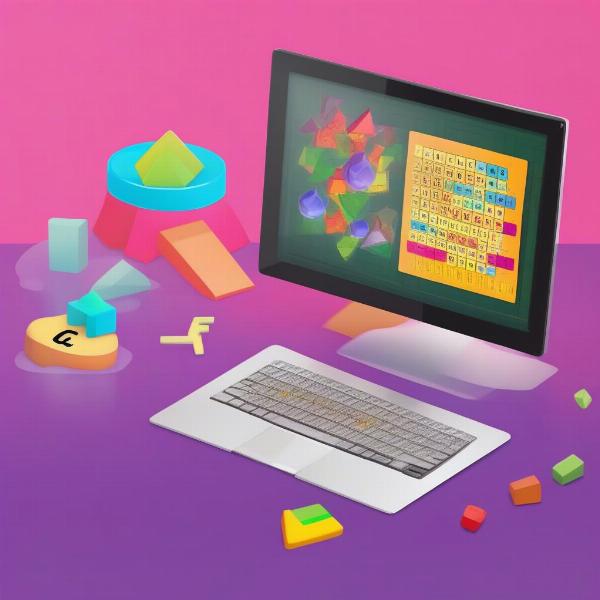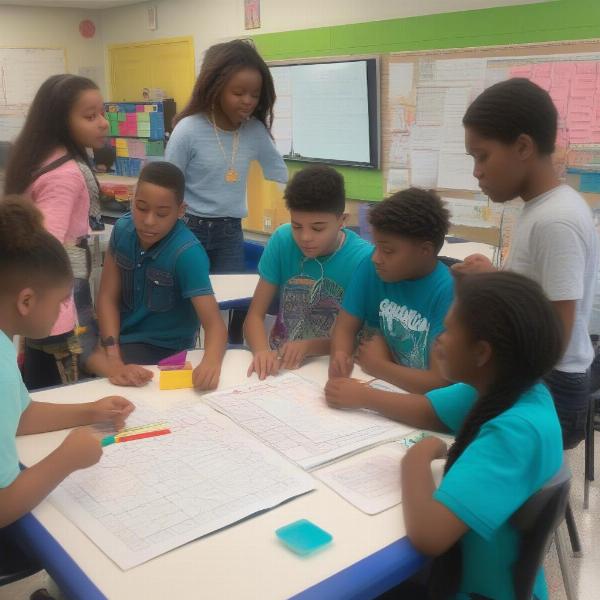Fun Math Games For Sixth Graders transform learning from a chore into an adventure. Sixth grade is a pivotal year for math, introducing more complex concepts like ratios, proportions, and early algebra. Engaging students through interactive games can significantly improve their understanding and retention of these crucial concepts.
Level Up Math Skills with These Exciting Games
Sixth graders are at a stage where they crave both fun and intellectual stimulation. Math games cater to both needs, providing a platform for learning that doesn’t feel like work. Whether in the classroom or at home, these games can reinforce fundamental skills and build a strong foundation for future math learning.
Dice Games for Number Sense Mastery
Dice games are a simple yet effective way to enhance number sense. Games like “Multiplication War” where students roll two dice and multiply the results, competing for the highest product, can solidify multiplication facts. Similarly, “Target Number” challenges students to use addition, subtraction, multiplication, or division with the numbers rolled on multiple dice to reach a predetermined target. These games encourage strategic thinking and quick mental calculations.
Card Games for Building Fluency with Fractions, Decimals, and Percentages
Card games can be adapted to reinforce various sixth-grade math concepts. A simple game of “War” can be modified to compare fractions or decimals. Students can also play “Go Fish” with fraction, decimal, or percentage equivalents, aiming to collect matching sets. These games provide repetitive practice in a fun context, leading to increased fluency.
Board Games for Strategic Thinking and Problem Solving
Board games often involve strategic planning and resource management, indirectly fostering mathematical thinking. Games like “Settlers of Catan” require players to calculate resource production and trade efficiently, while classic games like chess and checkers develop logical reasoning and problem-solving skills. While not explicitly math-focused, these games build valuable skills transferable to mathematical contexts.
 Sixth Grade Math Dice Games in Action
Sixth Grade Math Dice Games in Action
Online Math Games and Apps for Interactive Learning
The digital age offers a plethora of online math games and apps designed specifically for sixth graders. These platforms often provide personalized learning experiences, adapting to individual student needs and progress. Many games incorporate gamification elements like points, badges, and leaderboards, further motivating students to learn and improve.
Choosing the Right Online Math Games
When selecting online math games, it’s crucial to prioritize educational value and age appropriateness. Look for games aligned with the sixth-grade curriculum and offer clear learning objectives. Websites like Khan Academy Kids and IXL provide a wealth of resources and interactive exercises tailored to specific grade levels and skills.
 Engaging Online Math Games for Sixth Graders
Engaging Online Math Games for Sixth Graders
Creating a Fun and Engaging Math Learning Environment
Beyond specific games, fostering a positive attitude towards math is crucial. Encourage a growth mindset, emphasizing that mistakes are opportunities for learning. Celebrate successes, no matter how small, and create a supportive environment where students feel comfortable asking questions and taking risks.
Expert Insights:
-
Dr. Emily Carter, Educational Psychologist: “Creating a playful learning environment reduces math anxiety and allows students to explore concepts freely, leading to deeper understanding.”
-
Mr. Michael Johnson, Math Teacher: “Incorporating games into my lessons has transformed my classroom. Students are more engaged, motivated, and ultimately, perform better.”
 Fun Math Games and Activities in a Sixth Grade Classroom
Fun Math Games and Activities in a Sixth Grade Classroom
Unleashing the Power of Play in Math Education
Fun math games for sixth graders are not just a diversion but a powerful tool for enhancing learning. By tapping into students’ natural curiosity and desire for play, we can unlock their mathematical potential and pave the way for future success. Let’s embrace the power of play and make math an enjoyable adventure for all. Share this article with fellow educators and parents to spread the joy of learning!
Beyond Games: Exploring Other Engaging Math Activities
While games are a fantastic tool, incorporating a variety of engaging activities can further enrich the learning experience. Hands-on projects, real-world applications, and collaborative problem-solving tasks can provide different avenues for students to explore and internalize mathematical concepts.
Conclusion: Making Math Fun and Accessible
Fun math games for sixth graders are key to unlocking a love for learning. By incorporating engaging games and activities, both online and offline, educators and parents can transform math from a daunting subject into an exciting adventure. Remember to foster a positive and supportive learning environment to maximize the benefits of these fun learning tools.
FAQ: Frequently Asked Questions About Fun Math Games for Sixth Graders
-
What are the benefits of using math games in the classroom? Math games enhance engagement, improve problem-solving skills, and promote a positive attitude towards math.
-
Where can I find free online math games for sixth graders? Websites like Khan Academy Kids and IXL offer a variety of free math games.
-
How can I incorporate math games into my homeschooling curriculum? Integrate games into lesson plans as a warm-up activity, a reinforcement exercise, or a fun way to review concepts.
-
Are there math games that can be played without any materials? Yes, many mental math games and verbal puzzles can be played without any materials.
-
How can I make math games more challenging for advanced learners? Modify the rules to increase complexity, introduce time limits, or encourage students to create their own variations of the games.
-
What are some good math board games for sixth graders? Consider games like Prime Climb, Blokus, and Ticket to Ride, which encourage strategic thinking and spatial reasoning.
-
How can I encourage my child to enjoy math? Focus on making math fun and relevant to their lives. Use games, real-world examples, and a supportive learning environment to foster a positive attitude towards math.

